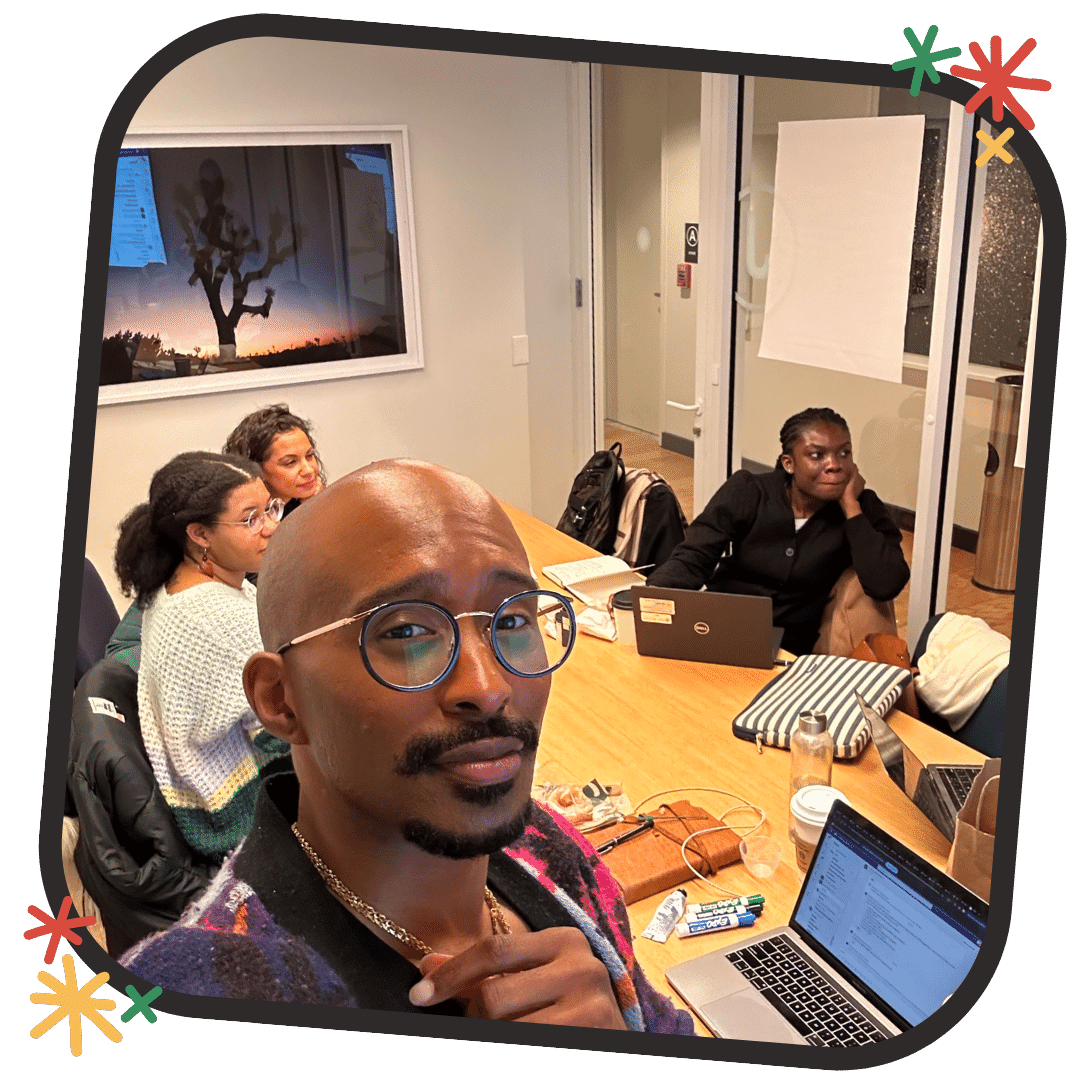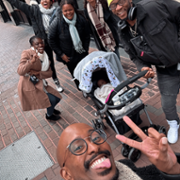Black in the Future
By Michael Everett, MHS, EdD | February 29, 2024
Chief People and Culture Officer, ETR
Often, when we think of Black History Month, we are prompted to consider the greatness of Blackness in the past. Honoring the past is essential, especially considering some of the erasure of Black people, histories, and experiences emphasized over the last few years. We must also continue to chart the path for what we intend for it to mean to be Black in the future.
In our constant effort to combat anti-Black racism and institutionalize our values, ETR leadership continues the progress by commissioning the Black to the Future (BTF) ETR workgroup.
Black to the Future is a team of Black-identified ETRians representing our core training, education, and research expertise. Having had to develop such a personal relationship with the trauma of anti-Black racism and oppression, coming together to make this commitment feels relevant in that it honors the ETRians who have come before us. It is evidence of our progress to walk the walk as an organization and not just talk the talk. Black to the Future is a response to past events to do better because we know better.
It's a critical time for this work for two key reasons:
1. The liberation of Black people has often meant the liberation of others. We see this as an opportunity to liberate our institution from the systemic business-as-usual practice that facilitates the historical culture of inequity that exists in many institutions, including non-profits—learning about the past experiences of Black ETRians and developing resources to create an alternative experience based in wellness and wholeness for the whole of ETR is a desirable benefit.
2. We can be leaders in under-charted territory— with an opportunity to do more than the talk that many institutions did during the onset of movements such as Black Lives Matter and commit to actual change. Under the leadership of the Culture team at ETR, Black to the Future is a team dedicated to ETRians dismantling anti-Black racism within the organization and in broader spheres, and we will accomplish this using our home-grown strategy birthed out of ETR's Health Equity Framework.
Black Health Equity Framework
ETR’s Health Equity Framework is a model that describes the ways that health and education outcomes are influenced by complex interactions between people and their environments. It is our shared language for talking about health and education equity. Here is how we have adopted this framework for our Black to the Future work:
a. Centering Black Voices: The workgroup recognizes the imperative of amplifying Black voices in discussions surrounding Black communities' physical, emotional, and mental health.
b. Challenging Tokenism: The focus is on creating an environment where Black voices are not merely present but actively contribute to decision-making processes, ensuring meaningful representation and dismantling tokenistic practices.
c. Decolonizing Traditional Approaches: The workgroup endeavors to explore and implement strategies for decolonizing traditional approaches to education, training, and research. Decolonizing involves reevaluating and restructuring educational, training, and research frameworks to ensure they are inclusive, culturally sensitive, and responsive to the diverse needs of Black communities.
What is most exciting about this opportunity is that we get to explore ways of evaluation and implement workplace patterns that will positively impact our internal communications and work relations. We are thrilled about having dedicated time to move us further away from inequities born and sustained out of white supremacy. Black to the Future represents our concern for the well-being of Black ETRians while offering solutions that will benefit any ETRians struggling with power dynamics and oppression.
Two initial forthcoming tools you can expect to see launched from this group are currently in the design and pilot phase but include:
Tools:
- Getting Grounded in Group Facilitation—which takes facilitation group agreements such as Step-up, Step Back (an agreement used to encourage more talking from those who do it less, taking up space for those who often get this opportunity) and explores agreements that can help marginalized groups navigate safety more proactively. BTF met and discussed which agreements might be of service during the strategic planning process and met with the facilitators to get their buy-in around using the agreements.
- Social Q is a model under development by BTF that calls individuals to safety prioritization and reflective accountability. In many workplace conflicts or difficult feedback situations, there is often a person who has the benefit of power due to one or more identities such as race, class, position, sex & gender, ability, and others. Marginalization also occurs when people lack equal access to the power associated with identities. BTF wants to level the playing field by creating accountabilities that help the empowered operate from a fair and safe place that they can facilitate and help practice safety when navigating issues, feedback, and or disagreements.
May this February serve as a reminder of the power of Black history and, equally as necessary, the evidence of that power in recognition of our Black present and the promise of a Black future!
Mi chael Everett (He/Him They/Them) is the Chief of People & Culture at ETR. A proud father, Michael holds a master’s in human services and doctorate in education and has served in various capacities from consultant to a Senior Research Associate within ETR and is currently invested in successfully supporting an agency culture that promotes wellness/wholeness, facilitates empowerment, and allows our staff to leave our organization better than they came in all the ways that we can professionally.
chael Everett (He/Him They/Them) is the Chief of People & Culture at ETR. A proud father, Michael holds a master’s in human services and doctorate in education and has served in various capacities from consultant to a Senior Research Associate within ETR and is currently invested in successfully supporting an agency culture that promotes wellness/wholeness, facilitates empowerment, and allows our staff to leave our organization better than they came in all the ways that we can professionally.




